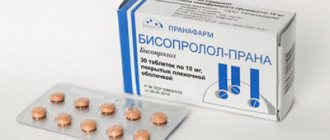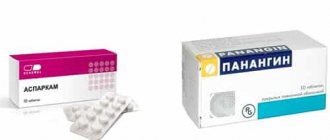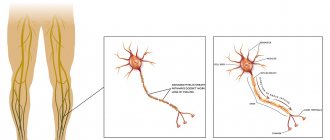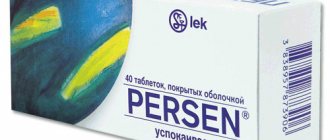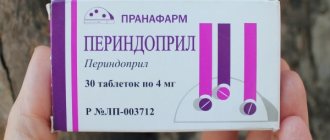pharmachologic effect
Pharmacological effects - antihypertensive, antianginal.
Blocks the flow of calcium ions through membranes into the smooth muscle cells of the myocardium and blood vessels (calcium channels). Vasodilation leads to a decrease in blood pressure. The antianginal result is due to both a decrease in oxygen consumption, due to the dilation of arterioles and a decrease in peripheral vascular resistance (afterload), and an increase in oxygen delivery due to dilatation of the main coronary arteries and arterioles in ischemic and unchanged areas of the myocardium.
Side effects
Vero Amlodipine tablets are well tolerated by patients, but undesirable effects may develop. Side effects of the drug Vero-Amlodipine:
- cardiovascular system: increased heart rate, swelling of the lower extremities, with sudden withdrawal - an attack of angina, in case of overdose - arrhythmia, hypotension;
- gastrointestinal tract: dyspepsia, loss of appetite, pain in the abdomen;
- musculoskeletal and muscular system: pain in skeletal muscles, joint pain, convulsive condition;
- central nervous system: dizziness, malaise, asthenia;
- pollakiuria;
- gynecomastia in men;
- allergic manifestations of immediate and delayed type;
- impaired visual acuity.
To avoid side effects, it is recommended that the dose be selected by a specialist.
Indications for the drug Vero-Amlodipine
Arterial hypertension (first-line drug for monotherapy or in combination with other antihypertensive drugs), stable angina, vasospastic angina (Prinzmetal's angina, or variant angina), vasospasm/vasoconstriction, dilated (non-ischemic) cardiomyopathy with severe chronic heart failure (III- Stage IV), as well as patients refractory to treatment with nitrates or beta-blockers (monotherapy or in combination with other antianginal drugs).
Instructions for use
According to the instructions for use, the drug Vero Amlodipine is used according to the following scheme:
- Consumption is made in the morning.
- The tablet is placed in the mouth and swallowed without chewing.
- Take 130 ml of water.
- After oral administration, it is advisable to have a low-fat breakfast.
The dosage is adjusted taking into account the underlying disease, concomitant pathology, and the patient’s age. The starting dose for hypertension and angina is 5 mg. Can reach up to 10 mg. For dilated CMP, start with 2.5 mg. The maximum intake is 10 mg per day.
During the period of selecting a personal dose, regular examination by a specialist is required. If side effects or ineffective treatment are detected, the amount of Vero-Amlodipine consumed is reduced or increased.
Special instructions:
- Prescription for children, pregnant and lactating women is not recommended: there is insufficient evidence for this category of persons;
- Abrupt withdrawal of the drug is undesirable; clinical cases indicate the occurrence of extraordinary attacks of angina pain;
- use during a hypertensive crisis is ineffective, this is due to a slow increase in the therapeutic dose, thus emergency assistance will not be provided, time will be lost, and irreparable consequences may occur;
- the advantage of using the drug Vero Amlodipine for blood pressure and other diseases is that it does not affect the level of potassium, glucose, thyroid hormones, lipoproteins, cholesterol, creatinine;
- It is recommended to regularly visit a dentist to examine the oral cavity for bleeding and hyperplastic processes of the gums;
- with caution when driving vehicles and operating other mechanisms that require constant attention and quick reaction.
Blood pressure norms
Action of Vero-Amlodipine
The drug Vero-Amlodipine mainly consists of the active substance of the same name. This medication is widely prescribed by general practitioners and cardiologists as a means to combat hypertension and more. The medicine is available in dosages of 5 and 10 mg, and the additional components are starch, magnesium stearate, monohydrate and other substances.
The drug is prescribed to patients who suffer from the following diseases:
- primary and secondary hypertension;
- various forms of angina;
- heart failure, etc.
The drug is prescribed only after examination by a doctor and receipt of examination results. The medicine is mainly prescribed to people with high blood pressure, i.e. systolic (upper) pressure more than 140 mmHg. Art. for a long time.
The annotation recommends using the drug in the first half of the day. The tablet is swallowed whole and washed down with water, then a low-fat breakfast is desirable. The dosage of the drug is prescribed individually, it is 5 mg per day, in some cases it can reach 10 mg per day.
Like all drugs, the medication has contraindications. In some cases, failure to comply with the instructions can be fatal. The drug is contraindicated in children under 18 years of age, as well as in women during breastfeeding and pregnancy. Abruptly stopping therapy with this medication may cause an attack of angina. It is strictly not recommended to use the drug during a hypertensive crisis; it is not only ineffective, but also life-threatening.
In general, Vero-Amlodipine is well tolerated, but there are special cases of overdose in which the following side effects may occur:
- swelling of the legs;
- accelerated heartbeat;
- pain in the abdominal area;
- nausea;
- general malaise;
- allergy;
- blurred vision.
The drug vero-amlodipine is widely prescribed by general practitioners and cardiologists as a means of combating hypertension and more.
Indications for use, restrictions
Often patients do not know what the drug is used for. The following pathological conditions are considered indications for its use:
- persistent increase in blood pressure (hypertension);
- attacks of angina (stable, variant), including their prevention;
- non-ischemic cardiomyopathy;
- chronic form of heart failure;
- cardiac ischemia.
IHD
The medicine is used as monotherapy or as part of complex treatment together with other antihypertensive or antianginal drugs. The treatment regimen is determined by the attending physician.
Before using the product, you should study its contraindications. It is prohibited to use when:
- presence of low blood pressure (hypotension);
- individual intolerance to components;
- pregnancy;
- lactation.
Also, you should not treat children under 18 years of age with this remedy.
The restrictions are:
- aortic, mitral stenosis;
- severe liver pathologies;
- weakness of the sinus node;
- acute period of heart attack;
- old age.
Mitral stenosis
In such conditions, the medicine is prescribed with caution if the benefit from it is higher than the expected harm.
Adverse reactions
Side effects may manifest themselves in changes in the patient’s general condition in the form of headache, dizziness, increased drowsiness, depression, fatigue, malaise, and decreased ability to work. On the part of the digestive organs, signs of dyspeptic disorder develop - nausea, vomiting, abdominal pain, loss of appetite, stool disturbances.
Since the drug is excreted by the kidneys, long-term use may result in an increase in the daily amount of urine. Metabolism of "Vero-Amlodipine" occurs in the liver, so a transient increase in the level of ALT, AST, bilirubin is possible, and jaundice appears. These conditions have a reverse course after discontinuation of the drug. On the part of the cardiovascular system, negative effects develop such as tachycardia, swelling of the lower extremities, and arterial hypotension.
Substitutes
Vero-Amodipine analogs are used if there is hypersensitivity to the main substance of this medicine. You can use calcium channel blockers such as Verapamil, Nifedipine, Isradipine, Lacidipine, Diltiazem. If during the treatment the receptors have become insensitive to this group of drugs, representatives of other antihypertensive drugs are used, including Furosemide, Valsartan, Losartan, Atacand. You can alternate these medications so as not to deplete the receptors that respond to them.
Overdose
The maximum permissible dose for treatment is 10 mg per day. As a rule, the patient is prescribed 5 mg per day, and if necessary, the dose is adjusted by the attending physician. Failure to comply with or unauthorized increase in dosage may result in an overdose, resulting in the following symptoms:
- tachycardia;
- deterioration of perfusion of internal organs;
- hypotension.
In case of an overdose of Amlodipine, dialysis is not effective. The patient urgently needs to rinse the stomach and give activated carbon (or another adsorbent) to drink. The victim should be placed on a hard surface, making sure that the legs are slightly elevated. Continuous monitoring of the function of the respiratory and cardiovascular systems, general blood circulation, and diuresis is carried out. As a rule, treatment is prescribed symptomatically. The doctor may also prescribe maintenance treatment - intravenous administration of mezatone and dopamine.
Analogues and substitutes
Complete analogues of Amlodipine:
| Name | Price 30 tablets 10 mg, rub. | Pharmaceutical company | A country | ||
| Norvask | 901 | Pfizer | USA | ||
| Normodipine | 640 | Gedeon Richter | Hungary | ||
| Cardilopin | 571 | Aegis | |||
| Amlovas | 300 | Unique Pharmaceutical | India | ||
| Kalchek | 278 | Ipka | |||
| Amlotop | 124 | Hemofarm | Serbia | ||
| Amlorus | 80 | Synthesis | RF | ||
Amlodipine substitutes with a composition completely identical to Norvasc (including amlodipine besilate) have been produced since 2007, when patent protection for the original drug ceased to apply. Until this time, some pharmaceutical companies produced generic drugs containing amlodipine maleate. Among such drugs, Amlodigamma (VervagPharma), Tenox (KRKA, Slovenia) and Stamlo M (Radish, India) were registered in Russia. Only Tenox is currently on sale; 30 tablets of 10 mg cost about 460 rubles.
In terms of the hypotensive effect of amlodipine maleate, it is slightly weaker than amlodipine besilate. According to a 2005 study, besilate helps normalize low blood pressure in 92% of patients, maleate in 86%.
Amlodipine is a mixture of S and R isomers. For a long time, scientists believed that only the S isomer was the active substance. The Actavis Group company even released the drug EsCordi Core (price about 300 rubles), which uses the S isomer levamlodipine. It is more effective than Amlodipine in reducing blood pressure (a dose of 2.5 mg of levamlodipine corresponds to 5 mg of amlodipine) and is less likely to cause edema. Unlike Amlodipine, EsCordi Cor does not improve endothelial function, since, together with the R isomer, the drug also lost its effect on the release of nitric oxide.
special instructions
Patients with chronic heart failure should use the tablets with caution. In this case, swelling of the lungs is possible, but there are no characteristic signs. It is necessary to take the drug with special attention in case of development of aortic stenosis and in the presence of signs of liver and kidney dysfunction.
Features of application
- Pregnancy and lactation. Doctors have not clarified the effect of the drug on the fetus during pregnancy and on the child during feeding. Can be used only in extreme cases with a doctor's prescription. If used during lactation, breastfeeding should be discontinued.
- Children under 18 years of age. Doctors have not established the effect of active substances on the child’s body. Therefore, children should avoid taking the drug.
- Aged people. The medication is allowed, but there is no need to adjust the dosage.
- Renal and/or liver dysfunction. Use the medicine with extreme caution and on the advice of a doctor.
